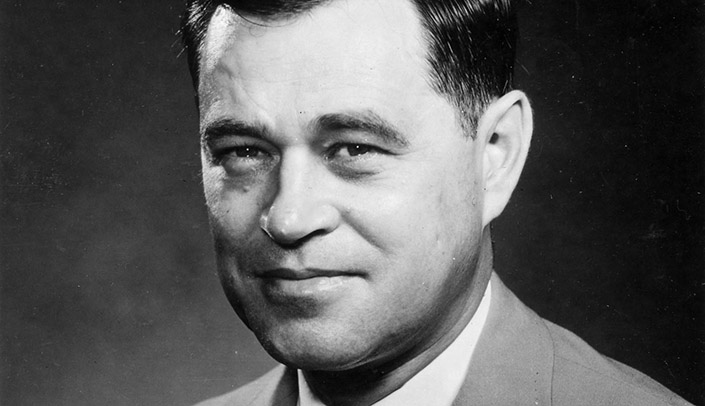Merle “Jim” Musselman, MD, was the University of Nebraska College of Medicine’s first full-time chair of surgery, appointed in 1956.
Born in Topeka, Kansas, in 1915, Dr. Musselman received his MD from the University of Nebraska College of Medicine in 1939. He interned at Long Island College Hospital and the University Hospital at Ann Arbor, Michigan, in 1941. World War II interrupted his formal medical education — and catapulted him into events he could never have imagined.
Dr. Musselman joined the Army Medical Corps in July 1941 and was assigned to Fort Bliss, Texas. The Army then shipped him to Clark Air Base, Philippines. Nine hours after the Pearl Harbor attack, Clark Air Base was attacked. Dr. Musselman saw the destruction and attended to the wounded. American troops, including Dr. Musselman, withdrew to the Bataan Peninsula and eventually surrendered on April 9, 1942.
Captured American and Filipino soldiers were forcibly marched to train cars and endured another trek to Camp O’Donnell, a total of 60-69 miles. Survival along the march and at the prisoner of war (POW) camp was tenuous. Army medical personnel like Dr. Musselman struggled to treat their fellow inmates. Heat, exhaustion, physical abuse and malnutrition during what later became known as the Bataan Death March afflicted the men.
Conditions at the camp were no improvement. Malnutrition, starvation, malaria, dysentery, Beriberi, and pellagra were constant complaints. Dr. Musselman and his medical colleagues did their best to treat these ailments. They developed a vitamin B source to supplement diets by creating yeast culture from a mixture of corn starch, sugar, rice and water to treat beriberi and pellagra.
Dr. Musselman remembered: “We, as physicians, were somewhat inured to suffering, but our hearts ached as all day long these pitiful creatures would file by us in the dispensary asking for help. Although we knew how to help them, we had no help to give.”
Allied forces liberated Camp O’Donnell in January of 1945. Dr. Musselman was discharged from the Army with the rank of captain in 1946, and the United States awarded him the Bronze Star.
Dr. Musselman’s colleagues from the POW camp remembered his “quiet imperturbability under stress,” his calm courage, honesty and dependability.
To learn more about how Dr. Musselman assisted with abdominal surgery on top of a school desk to remove shrapnel during the danger and chaos of the Camp O’Donnell liberation, read “Ghost Soldiers: The Epic Account of World War II’s Greatest Rescue Mission,” by Hampton Sides. Sides’ book is available in the McGoogan Library Special Collections and Archives.

Thanks to bringing this fascinating information to light for us.
wow! Incredible story.